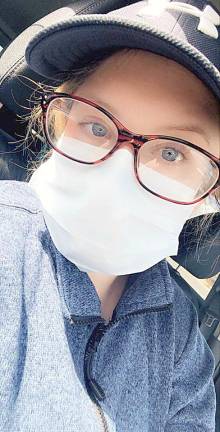‘The only reason I knew was because I got tested’
Monroe. 'Besides the pain, it was just another illness," said Cara Aubry-Shea, a soon-to-be SUNY Orange nursing graduate. "Unfortunately, for a lot of people that wasn’t the case, and I feel really lucky. I didn’t end up in the hospital. Stay away from the vulnerable population.'

Never in a million years did Cara Aubry-Shea, a soon-to-be SUNY Orange nursing graduate, think she’d be among those calling herself a COVID-19 survivor.
But she was, and grateful to have recovered from what’s considered to be a mild case.
How Aubry-Shea, who said she’s meticulous in making sure she practiced all the necessary precautions, caught the virus is tied to a student nurse’s need for child care.
Aubry-Shea’s 3-year-old son’s great-grandmother is his caretaker when she attends online school. The family knew the risks, but the great-grandmother was insistent she continue to care for him while Aubry-Shea attended school, because there was no other child care option.
In early April, the great-grandmother had what she thought was a sinus infection and didn’t think much of it. But symptoms persisted, and out of an abundance of caution, the great-grandmother’s doctor suggested she and her husband get tested due to their age.
Everyone was shocked to find out both great-grandparents tested COVID-19 positive.
Positive
Aubry-Shea, who gets sinus infections several times annually, and knew what the onset felt like, didn’t initially seem too concerned when those symptoms surfaced in her a few days later.
“At first I felt like I was getting a sinus infection,” the Monroe resident said. “I get them frequently so I know how it feels, bit of a headache, eye pressure, stuffy nose. Nothing out of the ordinary for a sinus infection, I would have thought.”
Then, she lost her sense of smell and taste.
Because Aubry-Shea knew her fiancé’s grandparents tested positive, she felt it was best to get herself tested.
There was no delay in getting the test, she said, speculating the quickness in getting it was because some of the hype tied to test availability had declined.
“There was swab up each nostril,” Aubry-Shea said. “The second time was worse than the first, because you knew what you were in store for. They have to go all the way back to get an accurate swab for testing.”
The next day she got the call: Positive.
My son
“I was surprised but I had a feeling because grandma’s symptoms were so similar to mine that I probably had it too,” she said. “My biggest complaint was the body aches, for about three days, pain in my upper legs and lower back. Constant pain and I’d feel the need to lay down to alleviate the pain. It was annoying. There was no medication. My doctor told me to call her immediately if I developed any respiratory issues.”
But she had a bigger concern: The couple’s 3-year-old son, who last saw his great-grandparents in the beginning of April.
“Because grandpa and grandma were positive, he was automatically quarantined, for two weeks, there no need to test,” Aubry-Shea said.
When he later developed a fever, the assumption was that he, too, caught the virus.
“He was a normal 3–year-old throughout everything,” she said. “It was just one day that he had a high fever, 103.6. After that he was more tired, laying around more than usual but his spirit was good. He was a happy 3-year-old.”
Aubry-Shea knows about the newly reported cases of multi-system inflammatory disease in children with COVID-19, which has symptoms similar toxic shock syndrome and Kawasaki disease.
“I will be watching him like crazy for the next month,” she said. “It’s petrifying, every parent’s worst nightmare.”
Aubry-Shea knows she, her son and her son’s great-grandparents are among the lucky ones to have such minor symptoms and are essentially back to being their normal selves.
'I feel really lucky'
“I would honestly rate it as a ‘2,’” she said. “I’ve been very sick before in my life and this wasn’t anything I couldn’t go through. Besides the pain, it was just another illness. Unfortunately, for a lot of people that wasn’t the case, and I feel really lucky. I didn’t end up in the hospital. Stay away from the vulnerable population.”
Aubry-Shea was contacted by the Orange County Department of Health for contact tracing. Only essential workers are retested to make sure they no longer have the virus, she added.
“This whole thing can just happen to anyone and you might not know you have it and spread to other people,” said Aubry-Shea. “I didn’t think what I had could be classified as COVID-19. The only reason I knew was because I got tested. You may be one of those people who doesn’t show symptoms. I wear my mask, and if I’m out, I take a shower and change my clothes when I get back. It still did not work out for me.”
She added: “One day someone’s fine and two days later they’re on a ventilator at the hospital. It’s scary, this virus is so unpredictable. Have compassion for anyone dealing with this.”
Aubry-Shea said she’s planning to donate plasma to help others.
“I hate getting blood taken from me, but if it’s going to help someone else, I will 100 percent do it,” she added. “No questions asked. If I can help someone with my antibodies, I will definitely do it.”
Editor’s note: Are you a COVID-19 survivor? Amid all the sadness of this outbreak, your story is a happy one to tell. We want to share it. Email us at: editor.pn@strausnews.com, and we’ll reach out to you. Most importantly, we’re glad you’ve recovered.